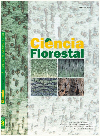
|
Ciência Florestal
Centro de Pesquisas Florestais - CEPEF, Departamento de Ciências Florestais - DCFL, Programa de Pós Graduação em Engenharia Florestal - PPGEF
ISSN: 0103-9954
EISSN: 0103-9954
Vol. 25, No. 2, 2015, pp. 437-445
|
 Bioline Code: cf15041
Bioline Code: cf15041
Full paper language: Portuguese
Document type: Review Article
Document available free of charge
|
|
|
Ciência Florestal, Vol. 25, No. 2, 2015, pp. 437-445
| pt |
DEMANDA DOS ESTADOS UNIDOS POR CARVÃO VEGETAL BRASILEIRO
Heimann, Jaqueline de Paula; Dresch, Andre Ramos & Almeida, Alexandre Nascimento
Resumo
O objetivo do trabalho é identificar quais variáveis afetam a demanda dos Estados Unidos da América pelo
carvão vegetal brasileiro e estimar as elasticidades das mesmas. O estudo utiliza o método dos mínimos
quadrados ordinários (MQO), optando pela forma funcional logarítmica, pela simplicidade em obter as
elasticidades, e adota o nível de significância de 5%. Os dados foram obtidos junto ao FAS e ao BEA
em período trimestral e corrigidos pelo IPC dos EUA. O modelo ajustado, embora tenha apresentado um
baixo coeficiente de determinação (R2), não apresentou maiores problemas estatísticos e econométricos. Os
resultados indicaram que a demanda dos EUA por carvão brasileiro pode ser explicada pelas expectativas
dos consumidores, preço do carvão brasileiro e pela renda norte-americana. Os preços de bens relacionados
do México e da Argentina não foram significativos a 5% de probabilidade, indicando que o carvão desses
países não são bons substitutos ao produto brasileiro.
Palavras-chave
carvão vegetal; econometria; comércio internacional
|
| |
| en |
THE DEMAND BY THE UNITED STATES OF AMERICA FOR THE BRAZILIAN CHARCOAL
Heimann, Jaqueline de Paula; Dresch, Andre Ramos & Almeida, Alexandre Nascimento
Abstract
The objective is to identify which variables affect the demand of the United States of America for the
Brazilian charcoal and estimate their elasticity. The study uses the method of ordinary least squares (OLS),
opting for the logarithmic functional form because of the simplicity in obtaining elasticity, and adopts the
significance level of 5%. The data were obtained from the FAS and the BEA in quarterly period and deflated
by U.S. CPI. The adjusted model, although having a low coefficient of determination (R2), did not have
greater statistical and econometric problems. The results indicated that the U.S. demand for the Brazilian
charcoal can be explained by the expectations of consumers, charcoal price and the U.S. income. The prices
of related goods from Mexico and Argentina were not significant at 5% level, indicating that the charcoal in
these countries is not good a substitute for the Brazilian product.
Keywords
charcoal; econometrics; international trade
|
| |
© Copyright 2015 - Ciência Florestal
Alternative site location: http://cascavel.ufsm.br/revistas/ojs-2.2.2/index.php/cienciaflorestal/index
|
|
